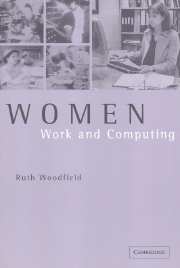Book contents
- Frontmatter
- Contents
- Preface
- List of abbreviations
- 1 The myth of the neutral computer
- 2 Computers, communication and change
- 3 Softech: a ‘twenty-first-century organisation’
- 4 Male and female pathways through the unit
- 5 Hybrids and hierarchies
- 6 Understanding the relationship between gender and skill
- 7 The female future and new subjectivities
- Conclusion: is the future female?
- List of references
- Index
Conclusion: is the future female?
Published online by Cambridge University Press: 22 September 2009
- Frontmatter
- Contents
- Preface
- List of abbreviations
- 1 The myth of the neutral computer
- 2 Computers, communication and change
- 3 Softech: a ‘twenty-first-century organisation’
- 4 Male and female pathways through the unit
- 5 Hybrids and hierarchies
- 6 Understanding the relationship between gender and skill
- 7 The female future and new subjectivities
- Conclusion: is the future female?
- List of references
- Index
Summary
the modern assembly-line worker has for some time been an outmoded symbol of modern industrial labor … another kind of labor has now come into symbolic prominence – the voice-to-voice or face-to-face delivery of service … there have always been public service jobs of course; what is new is that they are now socially engineered and thoroughly organised from the top.
(Hochschild 1983: 8)Modern servicing provision is based on the production and exchange of intangibles – knowledge, information, emotional support, co-operation and facilitation. The increasing centrality of these ‘products’ has put social labour of a variety of kinds more firmly on the map. Starting with Daniel Bell's claim in The Coming of Post-Industrial Society (1976) that the post-war growth of the service sector meant that ‘communication’ and ‘encounter’ has become the most salient relationship in the overall organisation of work, the assertion that the fastest-growing occupational group centres on workers who require ‘interpersonal’ skills to help them deal with people, as opposed to ‘mechanical’ skills which help them interact with objects, has become increasingly commonplace (Hochschild 1983; Adkins 1995: 5; Goleman 1995: 159; Offe 1985). Service-sector workers, perhaps represented most effectively by those in the burgeoning tourist industry, and knowledge workers, including doctors, lawyers, market analysts, educators, counsellors and administrators, are increasingly expected to deploy social and communication skills that conform to established general rules, regulations and values.
- Type
- Chapter
- Information
- Women, Work and Computing , pp. 186 - 197Publisher: Cambridge University PressPrint publication year: 2000



